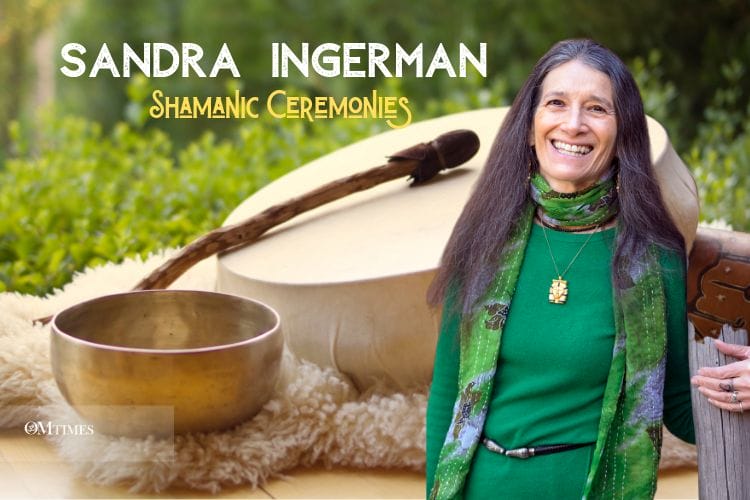Sandra Ingerman – Shamanic Wisdom

Sandra Ingerman is a world-renowned teacher who spent more than 35 years teaching shamanism workshops internationally and reversing environmental pollution using spiritual methods. She’s helped thousands of people heal from past and present traumas, through the classic shamanic healing method of Soul Retrieval. She is the award-winning author of 12 books, including Soul Retrieval, Medicine for the Earth, Walking in Light, and her latest work, The Book of Ceremony: Shamanic Wisdom for Invoking the Sacred in Everyday Life.
Interview with Sandra Ingerman – Ceremonies and Shamanic Wisdom
To listen to the full interview of Sandra Ingerman by Sandie Sedgbeer on the radio show, What Is Going OM on OMTimes Radio, click the player below.
Studies show that focused minds can influence physical reality in surprising ways. But while science is just beginning to understand the nature and scope of mind-matter interactions, shamans around the world have known for tens of thousands of years how to enter states of awareness that optimize these reality-bending effects through ritual or ceremony.
Sandra Ingerman joins us to discuss how we can use the ancient art of ceremony for waking up our intuitive knowing, releasing old wounds, invoking blessings and healing, creating our souls’ desires and dissolving collective negative energies such as hate and fear in the world.
Sandie Sedgbeer – Sandra Ingerman, welcome. You started the Book of Ceremony by sharing that you performed your first formal shamanic ceremony in 1982, shortly before you moved to Santa Fe, New Mexico. What first sparked your interest in ceremony and shamanism?
Sandra Ingerman – I got involved in shamanism in 1980. I was always the spiritual child, and I had three near-death experiences in my life that opened me up to different dimensions of reality. I also grew up in the ’60s, and we won’t go into that, but I did the whole 60’s experience, and so I was really searching for how to be a positive change.
The world didn’t make any sense to me, and it just seemed like people didn’t treat each other well, and we didn’t treat nature well and was aware of what was going on. I also grew up in Brooklyn, where it looked like everybody with suffering which they were, and so I really followed different spiritual traditions by reading books, but I didn’t have anything that gave me a structure like a practice, I just had information.
I was introduced to shamanic journeying in 1980. In shamanic journeying, shamans and shamanic practitioners work with water called helping compassionate spirits. I met my helping spirit, and he started answering all these questions for me about my life, and I felt I finally found my path. I was looking, but I had no path, no road map, and shamanic journey gave me that. I’d only heard as there wasn’t anything written back in those days, only a couple of books on shamanism. I had heard about ceremony and ritual, and my personality loves things like that, but I was terrified to perform a ceremony because I thought there were a right and a wrong way, and if you do a ceremony wrong, your life is over. I was too shy to even step forward to even thinking about performing the ceremony.
At that time, somebody called me for a shamanic healing session, and it turned out that she was famous in the Bay Area for leading ceremonies and had written a book. I said, let’s make a trade: you teach me how to perform a ceremony, and I’ll teach you shamanic journeying and do the healing work that you would love. She told me that there’s no right way to do a ceremony just get out and do it. And so that was the door, that opened me up to performing ceremonies and I just love them.
I just love them and I love sharing ceremonies with other people and bringing them into ceremonial work and right now my passion is trying to help people lead ceremony, simple ceremonies in their communities, where people don’t have to have any kind of religious belief or spiritual belief, where you just go in, and you use neutral words, but you help people in a community together release their pain, release their prayers, their fears, and to pray for each other, for the benefit of each other and it’s beautiful work.
Sandie Sedgbeer – Why is a ceremony, so important to people in shamanic cultures?
Sandra Ingerman – Well ceremony is a Sacred Act, and it bridges the sacred into everyday life. When we perform a ceremony, the beauty of performing a ceremony is that we set an intention and we design what we are going to work with, but once we actually step into performing a ceremony, we lift out of our own Human-ness, out of our rational minds and we become a divine being ourselves and through becoming a divine being and performing a ceremony, we actually create a line of connection between the Divine and us and the Divine without, and so we can set an intention of a prayer of asking for healing, or for a blessing, or honoring a transition that somebody’s going through.
It’s a way where we open up the veils between the ordinary and non-ordinary realms and we have that opportunity for whatever prayer we put out into the universe that, as long as we surrender the timing of the outcome, we do create a new form in our life, whatever we ask for that is answered in reciprocity. And so, in shamanic cultures, the ceremony was so important because when children were born, they were so honored because the shamanic community is one Organism and so everybody is part of that Organism and contributes a gift.
It’s not like in our culture, where we’re so isolated and separated. Everybody works together. When a new baby is born into a shamanic culture that’s a big deal: a being is coming in, who is going to contribute to the survival of the community.
Shamans perform ceremonies for Rites of Passage is because every time you make a change in life when you go from childhood to puberty, or you get married, or you give birth: you now have different gifts that you are going to bring into the community and a ceremony to acknowledge that change is important.
Shamans perform ceremonies to create harmony between humankind and the environment. In Shamanic cultures, people talked to the elements. They talk to everything alive. Shamans could perform ceremonies for the rains come to feed the crops so that the people might survive or that the rains be mitigated a bit so much flooding doesn’t happen.
Ceremonies have always been used to honor a change, but also to create harmony and to ask for blessings about what would help the community and individual survive.
Sandie Sedgbeer – They also bring the community together, don’t, they and they create a focus for the community.
Sandra Ingerman – It’s amazing. In my 35 years of leading ceremonies around the world, people bond in ways that I’ve never seen before. I call shamans, “Gardeners of Energy” and they work with the energetic garden of Spirit.
When we try to build a new landscape, or we want to build a new building, a structure in our life, a new dimension of reality. How shamans work with that is they prepare the ground and then they use ceremony to keep building energetic building blocks. That will grow into a beautiful form and physical landscape overtime. I’m talking using a metaphor here. But, if we want to change the world from a shamanic point of view, we start to create building blocks in the unseen realm. It is because it’s known, in every spiritual tradition, that everything that forms in the physical realm starts in the invisible realms first. So you have to build in the invisible realm of substance first. By using the chanting, and ceremonies, and prayers, over time, we keep building new energetic blocks that start to take the place of the fabric of the reality that is now unraveling. We create a beautiful new fabric of reality using ceremony.
Sandie Sedgbeer – So what are the most important elements that we would need to create a powerful ceremony?
Sandra Ingerman – Intention. What is your intention? The intention is so important. We have to surrender the outcome and the timing of the outcome because we are working outside of time, but the intention is really important.
Continue to Page 2 of the Interview with Sandra Ingerman
A veteran broadcaster, author, and media consultant, Sandie Sedgbeer brings her incisive interviewing style to a brand new series of radio programs, What Is Going OM on OMTimes Radio, showcasing the world’s leading thinkers, scientists, authors, educators and parenting experts whose ideas are at the cutting edge. A professional journalist who cut her teeth in the ultra-competitive world of British newspapers and magazines, Sandie has interviewed a wide range of personalities from authors, scientists, celebrities, spiritual teachers, and politicians.





